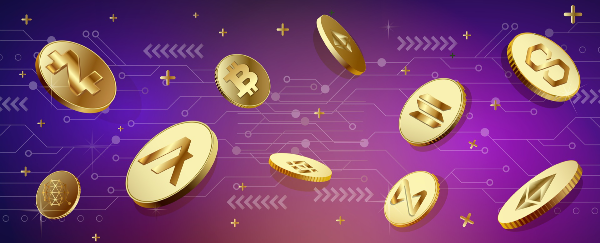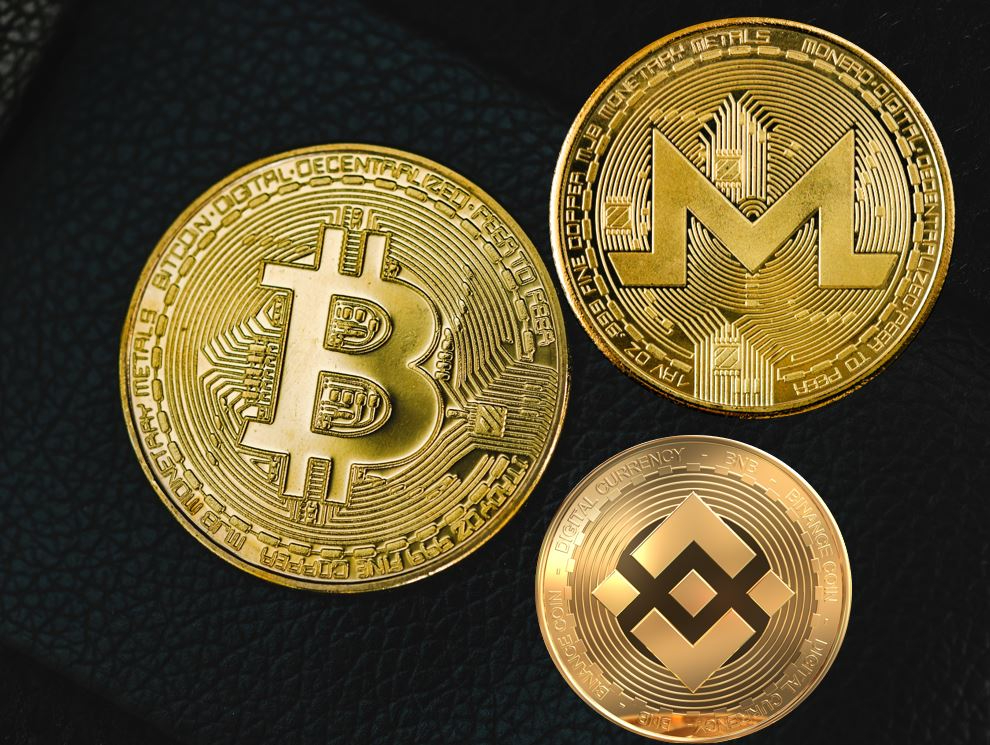The crypto space is full of jargon, but it’s not hard to understand once you get the hang of it. So if you've come across some new terms that you just can't seem to wrap your head around, here's a glossary for you.
In this article, we've put together 20 + common crypto terminologies every noob and pro should know with definitions so that you don't have to struggle anymore. Let's begin!
1. Address
The address is the location where your funds are stored in the blockchain network. It consists of two parts: public key (public) and private key (private). You need both of these keys to send or receive any transaction on the blockchain network.
2. Airdrop
An airdrop is when a cryptocurrency project gives away free tokens to its users. These tokens are usually given as rewards for taking part in certain activities such as referring friends, completing surveys, etc.
3. Altcoin
Altcoins are alternative cryptocurrencies based off of Bitcoin. They are often considered to be competitors to Bitcoin. Some altcoins even use different consensus algorithms than Bitcoin. For example, Ethereum uses the Proof-of-Work algorithm while Ripple uses Proof-of-Stake.
4. Ape in
An ape in is someone who rushes into the purchase of a new NFT or currency without conducting any investigation or due diligence. The 'apes together strong' meme served as inspiration for this term. It is, however, always a good idea to do your own research and find out what you're getting into so you don't ape in a project.
5. Block
A block is a collection of transactions that are linked to each other chronologically. Each block has a timestamp (block time), which is used by miners to verify whether the block is valid or not. If the block is valid, then they will add it to the chain. Blocks also contain a hash value, which is used to authenticate the block.
6. Blockchain
Blockchain is the technology behind all cryptocurrencies. It works by using a distributed ledger system that records all transactions made through the network. Every computer connected to the network stores a copy of the ledger, and everyone gets updated whenever there's a change.
7. Bot
A bot is an automated software program that runs 24/7 without human intervention. Bots are commonly used to perform repetitive tasks in exchange for payment. This could include tasks like mining, data entry, social media posting, etc.
8. Crypto Faucet
A faucet is a website that provides free coins for a limited amount of time. Usually you're required to enter your email address to gain access to the faucet. You'll receive emails requesting verification which will likely require you to deposit more funds into your account. Once verified, you'll have access to the faucets resources.
9. DAO
DAO stands for Decentralized Autonomous Organization. It's basically a smart contract that runs completely independent from any central authority or government.
10. dApp
dApps are applications built on top of the Ethereum platform. They can be accessed via web browsers, mobile apps, and even websites. Many people mistakenly refer to all smart contracts as dApps. However, only some smart contracts run on the Ethereum blockchain.
11. DeFi
DeFi is short for decentralized finance. It refers to financial services provided over blockchains, eliminating the need for trusted third parties. Examples of deFi projects include Compound Finance, Dharma, Lending Club, Maker, dYdX, and Bancor.
12. Degen
Degen is short for "degenerate," and often refers to those who frequently make reckless and poor bets. Those that engage in digital assets like NFTs without performing adequate due diligence are said to be "degens" in the crypto community.
13. Devs
Devs stand for developers. In the world of cryptocurrency, devs work on open source projects such as GitHub. Open source projects provide free access to programmers around the world to contribute to development.
14. DEX
DEX is short for decentralized exchanges. These platforms allow users to trade cryptocurrencies without the need for centralized intermediaries. Popular DEXes include Sushiswap, Pancakeswap, 1Inch, and Uniswap.
15. Discord
Discord is a messaging app with voice chat capabilities. It's popular among gamers, techies and crypto enthusiasts due to its intuitive interface. Most crypto and NFT communities like to keep their discussions going on Discord because it allows them to communicate easily while maintaining anonymity.
16. DYOR
DYOR means "Do Your Own Research." The motto applies to both investing in stocks and cryptos. Some investors prefer to do their own research before buying into a coin. They try to understand what drives a certain price and how the fundamentals of a project play out over time.
17. ETH
ETH is short for ether. Ether is one of many cryptocurrencies running on the Ethereum blockchain. It's considered to be the flagship currency of the Ethereum network.
18. ERC20
ERC20 is short for Ethereum Request For Comment 20. It was created by the Ethereum Foundation to give standards for creating new types of tokens.
19. FUD
FUD stands for fear, uncertainty, and doubt. It's a common tactic used by institutions to discourage people from trading a particular asset. Unfortunately, this kind of talk also creates an atmosphere of negativity that can scare away potential investors.
20. HODL
HODL stands for "hold on for dear life." This phrase is heavily associated with Bitcoin maximalists. HODLers believe that Bitcoin will always have value
and will go up in price despite market corrections.
21. ICO
ICOs stands for initial coin offerings. An ICO is a fundraising mechanism for start-up companies seeking capital. To initiate an ICO, the company must write up a white paper with detailed information about its project. After collecting funds, the company must create its own cryptocurrency token and sell them to investors.
22. Smart contracts
Smart contracts help automate contractual agreements. Because smart contracts run on distributed ledgers, they're more secure than traditional legal contracts. Many observers think that smart contracts will eliminate the need for lawyers and courts.
23. Whale
Whales are large investors who buy huge amounts of coins at once. Their purchases affect the overall supply of a given cryptocurrency. When whales enter the market, prices tend to drop until they leave again.
24. WAGMI
WAGMI stands for "we all gonna make it." This phrase is used to describe the future hopes that most investors have when they invest in
cryptocurrencies.
25. YOLO
YOLO stands for "you only live once." In other words, enjoy yourself now or regret it later! Do not put too much pressure on yourself to perform well right away. Take your time learning about crypto and getting comfortable with making investments.
Read Also: Bored Ape Yacht Club: The Apex NFT Project
Conclusion
Now you know the meaning of these 25 crypto terminologies. Hopefully, these definitions will help you navigate through the often-confusing world of digital currencies.












The crypto space is full of jargon, but it’s not hard to understand once you get the hang of it. So if you've come across some new terms that you just can't seem to wrap your head around, here's a glossary for you.
In this article, we've put together 20 + common crypto terminologies every noob and pro should know with definitions so that you don't have to struggle anymore. Let's begin!
1. Address
The address is the location where your funds are stored in the blockchain network. It consists of two parts: public key (public) and private key (private). You need both of these keys to send or receive any transaction on the blockchain network.
2. Airdrop
An airdrop is when a cryptocurrency project gives away free tokens to its users. These tokens are usually given as rewards for taking part in certain activities such as referring friends, completing surveys, etc.
3. Altcoin
Altcoins are alternative cryptocurrencies based off of Bitcoin. They are often considered to be competitors to Bitcoin. Some altcoins even use different consensus algorithms than Bitcoin. For example, Ethereum uses the Proof-of-Work algorithm while Ripple uses Proof-of-Stake.
4. Ape in
An ape in is someone who rushes into the purchase of a new NFT or currency without conducting any investigation or due diligence. The 'apes together strong' meme served as inspiration for this term. It is, however, always a good idea to do your own research and find out what you're getting into so you don't ape in a project.
5. Block
A block is a collection of transactions that are linked to each other chronologically. Each block has a timestamp (block time), which is used by miners to verify whether the block is valid or not. If the block is valid, then they will add it to the chain. Blocks also contain a hash value, which is used to authenticate the block.
6. Blockchain
Blockchain is the technology behind all cryptocurrencies. It works by using a distributed ledger system that records all transactions made through the network. Every computer connected to the network stores a copy of the ledger, and everyone gets updated whenever there's a change.
7. Bot
A bot is an automated software program that runs 24/7 without human intervention. Bots are commonly used to perform repetitive tasks in exchange for payment. This could include tasks like mining, data entry, social media posting, etc.
8. Crypto Faucet
A faucet is a website that provides free coins for a limited amount of time. Usually you're required to enter your email address to gain access to the faucet. You'll receive emails requesting verification which will likely require you to deposit more funds into your account. Once verified, you'll have access to the faucets resources.
9. DAO
DAO stands for Decentralized Autonomous Organization. It's basically a smart contract that runs completely independent from any central authority or government.
10. dApp
dApps are applications built on top of the Ethereum platform. They can be accessed via web browsers, mobile apps, and even websites. Many people mistakenly refer to all smart contracts as dApps. However, only some smart contracts run on the Ethereum blockchain.
11. DeFi
DeFi is short for decentralized finance. It refers to financial services provided over blockchains, eliminating the need for trusted third parties. Examples of deFi projects include Compound Finance, Dharma, Lending Club, Maker, dYdX, and Bancor.
12. Degen
Degen is short for "degenerate," and often refers to those who frequently make reckless and poor bets. Those that engage in digital assets like NFTs without performing adequate due diligence are said to be "degens" in the crypto community.
13. Devs
Devs stand for developers. In the world of cryptocurrency, devs work on open source projects such as GitHub. Open source projects provide free access to programmers around the world to contribute to development.
14. DEX
DEX is short for decentralized exchanges. These platforms allow users to trade cryptocurrencies without the need for centralized intermediaries. Popular DEXes include Sushiswap, Pancakeswap, 1Inch, and Uniswap.
15. Discord
Discord is a messaging app with voice chat capabilities. It's popular among gamers, techies and crypto enthusiasts due to its intuitive interface. Most crypto and NFT communities like to keep their discussions going on Discord because it allows them to communicate easily while maintaining anonymity.
16. DYOR
DYOR means "Do Your Own Research." The motto applies to both investing in stocks and cryptos. Some investors prefer to do their own research before buying into a coin. They try to understand what drives a certain price and how the fundamentals of a project play out over time.
17. ETH
ETH is short for ether. Ether is one of many cryptocurrencies running on the Ethereum blockchain. It's considered to be the flagship currency of the Ethereum network.
18. ERC20
ERC20 is short for Ethereum Request For Comment 20. It was created by the Ethereum Foundation to give standards for creating new types of tokens.
19. FUD
FUD stands for fear, uncertainty, and doubt. It's a common tactic used by institutions to discourage people from trading a particular asset. Unfortunately, this kind of talk also creates an atmosphere of negativity that can scare away potential investors.
20. HODL
HODL stands for "hold on for dear life." This phrase is heavily associated with Bitcoin maximalists. HODLers believe that Bitcoin will always have value and will go up in price despite market corrections.
21. ICO
ICOs stands for initial coin offerings. An ICO is a fundraising mechanism for start-up companies seeking capital. To initiate an ICO, the company must write up a white paper with detailed information about its project. After collecting funds, the company must create its own cryptocurrency token and sell them to investors.
22. Smart contracts
Smart contracts help automate contractual agreements. Because smart contracts run on distributed ledgers, they're more secure than traditional legal contracts. Many observers think that smart contracts will eliminate the need for lawyers and courts.
23. Whale
Whales are large investors who buy huge amounts of coins at once. Their purchases affect the overall supply of a given cryptocurrency. When whales enter the market, prices tend to drop until they leave again.
24. WAGMI
WAGMI stands for "we all gonna make it." This phrase is used to describe the future hopes that most investors have when they invest in cryptocurrencies.
25. YOLO
YOLO stands for "you only live once." In other words, enjoy yourself now or regret it later! Do not put too much pressure on yourself to perform well right away. Take your time learning about crypto and getting comfortable with making investments.
Read Also: Bored Ape Yacht Club: The Apex NFT Project
Conclusion
Now you know the meaning of these 25 crypto terminologies. Hopefully, these definitions will help you navigate through the often-confusing world of digital currencies.